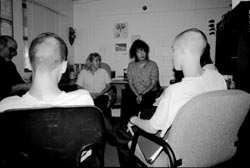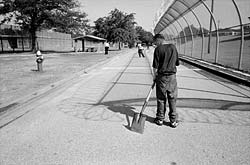 |
  |
 |
 |
 |
 |
 |
Bill
Haxton, chief psychologist for the South Carolina Department of Juvenile Justice. |
 |
  |
Many young people in South Carolina have better access to mental health
care in juvenile jail than they do outside the fence, back in their own communities.
Stephen Smith of American RadioWorks met with four young people: two still in the evaluation process,
and two who have been transferred out of the juvenile justice system
and into a locked treatment program run by the state's Health Department.
Tamika, age 16
SS: Tamika, how did you end up in the system?
Tamika: By getting in trouble at home, not listening, doing drugs,
trying to hang with the crowd.
SS: How old were you when you think you first started getting in
trouble?
Tamika: Thirteen. I'm ready to go home. I've been away from home for
about two years now. I'm ready to go.
SS: When you were evaluated, is that the first time you'd ever
seen or really been through a treatment for mental health questions?
Tamika: I was on medicine since I was in kindergarten. They had
me on some hyper….
SS: Hyperactivity?
 |
  |
 |
 |
 |
 |
 |
Teenage
inmates get group therapy at a South Carolina juvenile detention facility. |
 |
  |
Tamika: Ritalin. They said I was ADHD and they took me off when I got in 5th
grade. They said once I got older it would just agitate me more and I know when
they took me off I was still getting in trouble. They decided I was depressed,
manic-depressive, bi-polar.
SS: Do you think that's true?
Tamika: No. Sometimes I get depressed thinking about home. Yeah,
everybody gets depressed when they're not home with their family.
Robert, age 15.
SS: Robert, how did you first start getting in trouble?
Robert: I used to break into people's houses.
SS: When did you start doing that?
Robert: About 12 years old.
SS: When did somebody in your life also tell you that you had some
mental health issues going on? Was it when you were here in the
system?
Robert: I used to go see a psychiatrist. I wasn't sleeping right.
She said that I had depression.
SS: Being inside an institution can be depressing for anyone. Do
you think you had it before you came?
Robert: I think I had it but it was hard for me to notice it because
I think I handled it like anger. I mean, I didn't used to fight
a lot, but I got real frustrated.
SS: Are you on medication now?
Robert: An anti-depressant and something to sleep but I don't know
the name of it.
Corrie, age 18
SS: Corrie, what's the story of your trip here?
Corrie: I first got locked up when I was thirteen on a distribution
charge of marijuana. I got back out and started selling drugs again,
doing drugs, just hanging around the wrong crowd.
SS: And you're now staying not in a juvenile justice facility but
in a mental health kind of place, right? What's it like there?
Corrie: It's pretty straight there. Once you get on a higher level
you can go on passes, go on trips. Time goes by pretty fast.
Tamika: You go on trips, but other than that they still treat you
like you're in jail. You got people telling us what to do, what
time to wake up, when to eat and when to talk and all that, monitoring
our every move.
Adrian, age 17
SS: Adrian, what brings you here?
Adrian: I was put in back in December for truancy.
SS: Truancy?
 |
  |
 |
 |
 |
 |
 |
South
Carolina's juvenile jails try to help mentally ill inmates with treatment, school,
and work. |
 |
  |
Adrian: Yes sir. Smoking weed, smoking drugs.
(Adrian's speech is sometimes difficult to understand, in part
because he's on a psychiatric drug that can make him drowsy and
slur his speech, but Adrian says the medication helps "clear
his mind").
SS: What kind of thoughts were you having that needed to be "cleared
up?"
Adrian: The voices.
SS: You were hearing voices in your head?
Adrian: Yes sir.
SS: What were they telling you?
Adrian: I was just hearing them come, you know what I'm saying?
(During the conversation, sometimes Adrian laughs when no one's
said anything funny. It seems that he's laughing at something one
of the voices is saying in his head. The three other young people
slouch in their chairs and affect the flat, bored expression that
teenagers everywhere use when the going gets weird and they don't
quite know how to react. Robert, Corrie and Tamika readily agree
that Adrian is mentally ill, but not them.)
Tamika: I don't need to be on no medicine. I know what I'm doing.
And I know what's right and I know what's wrong. They just put me
on medicine to dope me up.
SS: Now, in addition to the medication, do you do any group counseling
or one-on-one?
Tamika: We do one-on-one, we have "anger management,"
we have "process group", we have all kinds of groups.
SS: You're kind of rolling your eyes as you say that. It sounds
like you don't believe much in that stuff. Corrie, do you think
there's any value in these various programs you've been sitting
through?
Corrie: I think the drug classes have helped me a lot, but I don't
see myself as being mentally ill. When they interviewed me and said
I was depressed, I kind of exaggerated a little bit.
SS: You exaggerated about being depressed. Why?
Corrie: Just because I'd get home earlier.
SS: Thinking that maybe it would help you get out of here sooner?
Corrie: Yeah, probably.
Return to Jailing the Mentally Ill homepage
|

